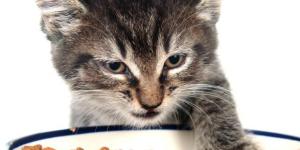Food You Can't Feed to Ferrets

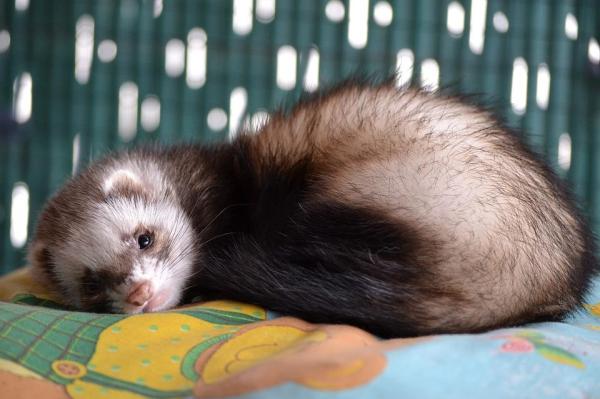
The popularity of ferrets as pets has grown in recent years, with a greater awareness of how best to care for them. Despite such popularity, there is still a lot to learn about how to best care for these animals. Fortunately, through the long process of domestication, we know a lot about a pet ferret's diet. We have learned what food they should and shouldn't eat. Ensuring we meet their nutritional requirements is important for maintaining overall health. There are also some foods which need to be avoided because they are dangerous for ferrets to eat.
At AnimalWised, we discover the food you can't feed to ferrets. We find out food needs to be excluded from a ferret's diet to avoid digestive problems and even serious illness.
- Foods that are harmful for ferrets
- Chocolate
- Coffee and caffeinated drinks
- Milk and dairy products
- Sugars and artificial sweeteners
- Onions, garlic and leeks
- Commercial food for dogs and cats
- Food for human consumption and junk food
- Corn, cereals and carbohydrates
- Cooked bones
- Alcohol
- Grapes and raisins
- Avocado
- Tips for correct feeding of ferrets
Foods that are harmful for ferrets
Some foods are bad for ferrets because they do not offer them the right nutrition. Eaten in large quantities, they might result in health problems such as obesity. Others are toxic for ferrets and can result in serious health problems. The foods you can't feed to ferrets include the following:
- Chocolate
- Coffee
- Dairy
- Sugars
- Onion
- Garlic
- Leeks
- Dog food
- Cat food
- Human food
- Cereals
- Cooked bones
- Alcohol
- Grapes
- Raisins
- Avocado
Foods that are harmful can cause problems, but toxic foods can cause the ferret to go into toxic shock if they eat too much. When you first adopt a ferret, we recommend consulting with a veterinarian specialized in small mammals to learn more about their diet and specific nutritional needs. Below we detail why these foods should not be included in your ferret's diet.
1. Chocolate
Chocolate and cocoa contain caffeine and theobromine, two substances potentially toxic to ferrets. Their body does not have the necessary enzymes to metabolize chocolate, meaning its consumption can cause digestive problems such as vomiting and diarrhea. In higher doses, ingesting chocolate could lead to seizures, tremors, fainting and even respiratory failure.
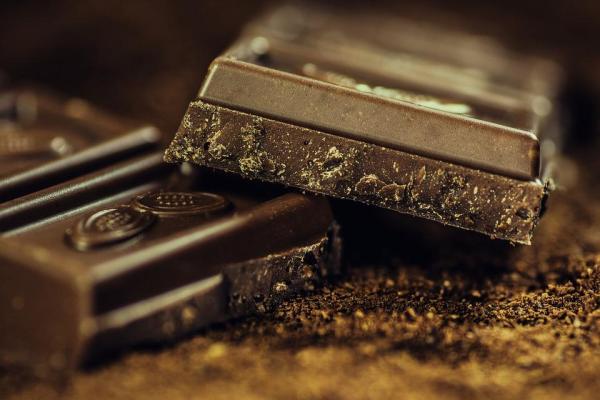
2. Coffee and caffeinated drinks
Like chocolate, coffee contains caffeine. However, the amount of caffeine in coffee is in a significantly higher dose. In addition to digestive disorders, ferret caffeine consumption can cause tachycardia, hyperactivity, anxiety and other behavioral problems. The risk of heart problems is also increased.
3. Milk and dairy products
As with most mammals, adult ferrets are lactose intolerant. During the lactation period, ferrets produce a high amount of the enzyme lactase, essential for digesting breast milk from their mother.
After a ferret's weaning period, their body radically reduces the production of this enzyme. This is because the adult ferret diet is based on the consumption of proteins of animal origin (ferrets are types of carnivorous animals). The vast majority of ferrets are unable to metabolize the lactose in milk and its derivatives. They may suffer allergic reactions and digestive problems when consuming them.

4. Sugars and artificial sweeteners
Artificial sugars and sweeteners include xylitol used in the manufacture of many sugar-free treats and snacks. These can be harmful to ferrets. Their body is not able to assimilate these compounds, which can poison them. This leads to gastrointestinal problems and increases their predisposition to obesity and associated diseases such as diabetes.
The ferret's pancreas secretes insulin to regulate blood sugar levels. This can lead to a relatively common ferret disease which affects the pancreas known as insulinoma in ferrets.
5. Onions, garlic and leeks
Onions, garlic and leeks contain a high content of disulfide a substance that can cause severe damage to red blood cells. Ingestion in sufficient amounts can impair their ability to deliver oxygen and iron to the body tissues of ferrets. Consequently, this increases the risk of developing anemia and symptoms of insufficiency due to poor oxygenation.
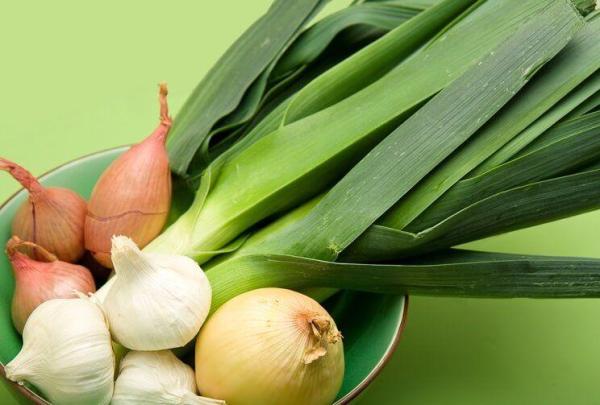
6. Commercial food for dogs and cats
Since ferrets are carnivores, there are many new ferret guardians who wonder can ferrets eat dog food? This is because dogs are also carnivorous and they assume the food will be suitable for others with a diet based on animal protein. Unfortunately, commercial dog food also contains a high percentage of fiber, carbohydrates and fats, foods unsuitable for the body of an obligate carnivore like the ferret.
Excess fiber and carbohydrates can cause serious digestive disorders in ferrets. They also the risk of nutritional deficiencies and anemia due to deficiency of animal proteins. Cat food tends to be less harmful, since felines are also obligate carnivores and these products contain a high intake of taurine. However, cat food should not be the basis for a diet that fully meets the nutritional requirements of ferrets, since it is specifically formulated for another species. The ideal is to purchase commercial feed formulated specifically for ferrets.
7. Food for human consumption and junk food
There some foods for human consumption can be beneficial for ferrets, such as beef, turkey or chicken. However, many other foods can be very dangerous for them. Processed, fried, high-fat foods and junk foods can cause rapid weight gain and gastrointestinal problems. If the ferret eats a small amount of your dinner, there may not be a problem. Regular feeding of these foods can be seriously harmful.

8. Corn, cereals and carbohydrates
Corn is one of the cereals richest in fiber and carbohydrates, which are very difficult for ferrets to digest. In addition to causing digestive problems, excess corn can end up fermenting in the ferret's stomach, causing a lot of discomfort and possible damage to its gastrointestinal tract. Other cereals and foods rich in carbohydrates should also be avoided, such as rice, beans, chickpeas, oats, bread and flour in general.
9. Cooked bones
Cooked bones are very dangerous for all pets, since during the cooking process the bones become less digestible and elastic. When they become brittle they can shatter easily into shards, seriously injuring their digestive tract when consumed. An example could be chicken wings, which should be avoided completely.
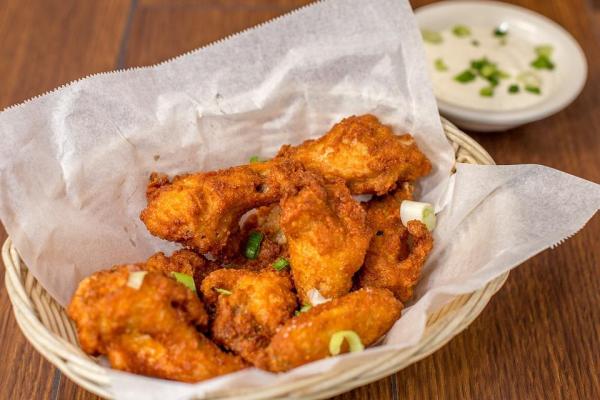
10. Alcohol
Alcohol and alcoholic beverages are very toxic to pets, including ferrets. As it acts directly on the nervous system, alcohol consumption can cause behavioral problems and alterations in your usual behavior.
In addition, alcohol affects the proper functioning of a ferret's vital organs. It can cause cardiorespiratory problems, liver and kidney damage.
11. Grapes and raisins
Consumption of grapes and raisins can lead to serious kidney problems in ferrets, as is the case in dogs and cats. Acute kidney problems can lead to chronic kidney failure. In case of poisoning we can observe vomiting, diarrhea, sensitivity and polydipsia (excessive thirst).
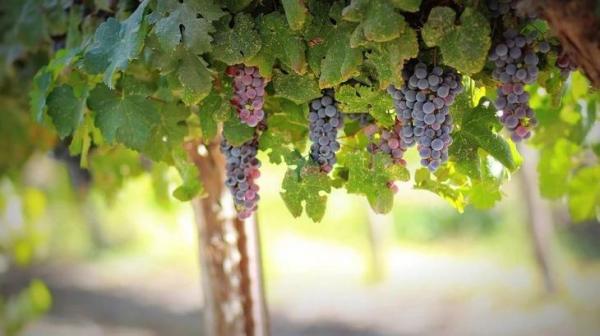
12. Avocado
In addition to its very high percentage of fat, avocado has a highly toxic substance for ferrets and other pets. This is the fungicidal toxin known as persin. Although it is believed this substance is present only in the skin and pit, it is advisable to completely avoid its consumption in ferrets.
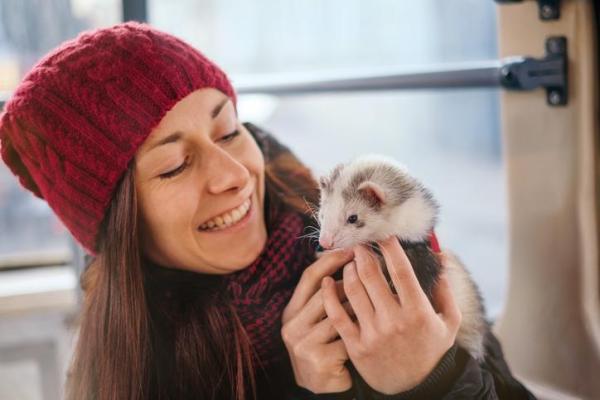
Tips for correct feeding of ferrets
Now we know the foods that ferrets can't and shouldn't eat, we can provide some general tips for ensuring your ferret has the best diet:
- Moderation with fruits and vegetables: even when we talk about fruits and vegetables that are beneficial for the health of ferrets, we must offer them in moderation. This is because they are foods rich in sugars and fibers. In addition, we must always remove the stone or seeds from certain fruits. This is because they contain cyanide which is highly toxic.
- Be careful with raw meats: as we have mentioned, ferrets are carnivorous animals. They must consume a minimum of 40% animal protein in their diet. Many guardians choose to offer a natural, raw diet to their ferrets. If so, it is essential to be very careful when offering raw meat. Food that is spoiled or improperly stored can cause serious health problems. They also do not always contains the amino acids and nutrients necessary for a healthy ferret, so they may require supplementation.
- Be careful with plants: since they are quite curious and active, ferrets may be tempted to explore the plants you grow in your home. Although they may be very beautiful, some species are very dangerous for ferrets. Oleander, poppies and daffodils are very toxic, among many others. Ideally, you should consult a trusted veterinarian to obtain a complete list of plants potentially toxic to ferrets so you can avoid them.
- Pay close attention to the organization of your home: you may not think to feed the above harmful foods for ferrets to your pet, but they may come across them when exploring. Since they are so curious, you need to be careful to keep them stored safely away from them. Do not leave potentially hazardous food out in the open where the ferret can have access.
Finally, we remind you of the importance of quickly going to a specialized veterinarian when you observe that your ferret has consumed some potentially toxic food or drink. Even if you have not seen them consume the toxic item, you may identify common symptoms of poisoning in ferrets such as vomiting, diarrhea, tremors, lethargy, drooling, seizures or difficulty breathing.
At the clinic, the professional will be able to analyze the health status of your ferret and evaluate the best treatment to combat negative symptoms and restore good health.
If you want to read similar articles to Food You Can't Feed to Ferrets, we recommend you visit our Diet problems category.


